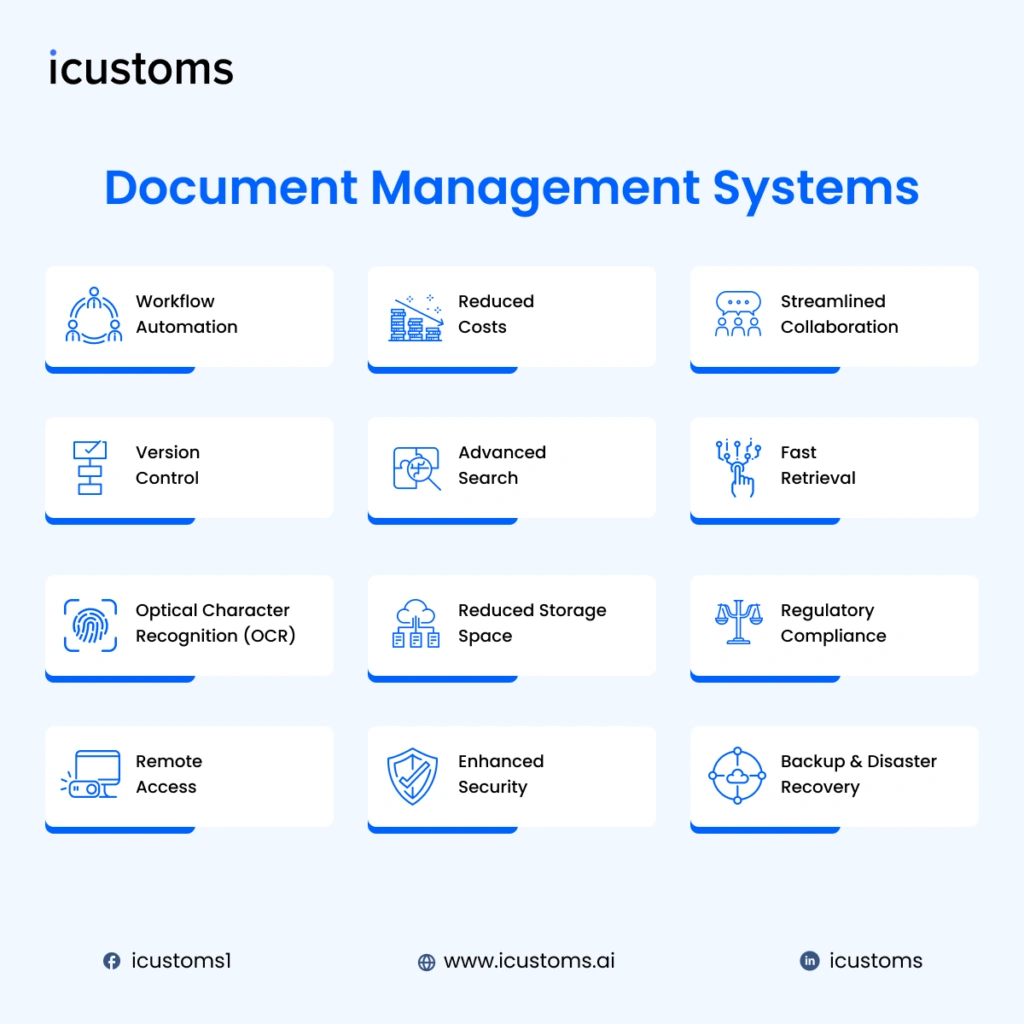Fast & Accurate ENS GB & EU ICS2 Solutions Built for You.
Five Easy Steps for Improving Customs Document Management
-
Freya Jane
- Director of Customer's Success
The customs sector is critical to the complicated landscape of international trade, acting as the fulcrum for the easy movement of products across borders while guaranteeing rigorous adherence to a wide range of legal and regulatory criteria.
“A study shows that 43% of workers would consider quitting their jobs if their employer did not provide them with an effective means of obtaining the documents they require to perform their tasks.”
The same research shows that,
“Not only is an inefficient document management system sufficient to cause some employees to quit, but the percentage can reach as high as 51% for workers in the 18-34 age range and 57% for the 34-44 age range.”
The effectiveness of the customs sector is dependent on strong customs document management standards that ensure correct recording, appropriate filing, and easy accessibility of these critical records for customs personnel.
This blog explores the critical importance of document management system workflow in the customs industry, highlighting its various advantages and inherent difficulties.
Why is Document Management Essential for the Customs Industry?
In order to guarantee that trade operations are carried out lawfully and morally, compliance is essential in the highly regulated customs business.
Customs officers have to make sure that the necessary paperwork is on hand and that they adhere to the regulations in order to avoid fines or penalties. The customs sector needs efficient document handling for a number of reasons.
Compliance
Risk management
Customs officers have to identify potential threats, such as prohibited or illegal products, and take appropriate action to prevent them from entering or departing the country. Identifying and reducing these hazards is made easier for customs brokers by efficient legal document management software.
Effective processing
Customs clearance requires the inspection and analysis of a huge number of papers. Proper document management ensures that paperwork is structured, accessible, and easy to examine, allowing customs authorities to process cargo more efficiently and effectively.
Customs clearance involves the review and analysis of a large volume of documents.
Transparency
Customs intermediaries must have access to precise and trustworthy information in order to ensure that the customs procedure is fair and truthful. Effective document management ensures that all shipment-related documentation is readily available and that customs officers may review it whenever they choose.
Freight forwarders frequently handle the creation, shipping, and tracking of customs paperwork as part of their services. However, they occasionally handle customs paperwork improperly.
Here are a few explanations of why this may occur:
Lack of experience
Customs laws and processes can be intricate and dynamic. Product forwarders may lack the knowledge required to handle these documents correctly, which may result in mistakes or non-compliance. For instance, customs laws vary throughout countries, and goods forwarders and middlemen might not be knowledgeable about the laws in a certain nation.
Time restrictions
Intermediaries adhere to strict timetables and deadlines. They can put finishing shipments on the fast track above, making sure all customs documentation is properly completed and filed. This may result in mistakes and possible hold-ups in the process of clearing customs.
Inadequate resources
It’s possible that customs professionals lack the manpower or technology needed to handle paperwork properly. They could find it difficult to keep up with the quantity and complexity of customs paperwork needed for every shipment without these tools.
Inadequate communication
The importer/exporter, customs authorities, and goods forwarder are all involved in the customs paperwork process. Insufficient communication between these parties may result in mistakes or missing paperwork. For instance, the importer/exporter might not give the goods forwarder all the required paperwork, which would result in an incomplete submission.
Cost concerns
Intermediaries may use less comprehensive, less expensive customs document management procedures in order to cut costs rather than follow regulations. This may result in mistakes, fines, and penalties, which would eventually increase costs.

Ways to improve customs document management
Invest in technology
Freight forwarders can access Innovative solutions such as iCustoms, which simplify the procedures for managing customs documents. These solutions help boost productivity, enhance compliance, and decrease mistakes.
Boost communication with other parties
Throughout the export and import customs clearance process, freight forwarders may help to foster better contact with other parties. By doing this, you can make sure that the clearance process goes well and that every necessary document is filed.
Put compliance above cost
Customs professionals should put compliance above cost, even if it means making an investment in more costly, comprehensive customs document management procedures. Over time, this can assist save money by lowering the possibility of fines and penalties.
Outsource customs document management
Freight forwarders have the option to contract with specialised outside parties to handle customs document management. By doing this, the goods forwarder may concentrate on other areas of their business while lowering the possibility of mistakes and increasing compliance.
How new technologies such as iCustoms can assist?
Automation
The customs document management process may be automated using iCustoms, which lowers mistakes and boosts compliance. Process optimisation may be achieved by automation, leading to increased speed and efficiency.
Data management
Freight forwarders may benefit from improved customs data management thanks to iCustoms. Our ntelligent document management solutions can guarantee compliance, lower the chance of mistakes, and increase productivity.
Analytics
iCustoms can offer insightful information about customs data, including trends, patterns, and possible risks. With the use of this data, freight forwarders may make well-informed decisions on the handling of customs documents and gradually enhance their procedures.
Communication
Communication is another area where technology may help parties engaged in the customs clearance process communicate better. Web-based portals, for instance, can facilitate real-time cooperation, enabling freight forwarders to swiftly and effectively connect with importers/exporters and customs officers.
Cloud-based applications
iCustoms cloud-based freight forwarders can also benefit from using cloud-based solutions to handle customs paperwork more effectively. Applications can increase flexibility and decrease delays by allowing users to manage documents at any time and from any location.
Last Words
In conclusion, there are a variety of reasons why goods forwarders and customs specialists might not process customs documentation accurately, including a lack of experience, a lack of time, a lack of resources, poor communication, or financial concerns.
FAQ's
What is the customs documentation process?
The customs documentation process includes a comprehensive assessment and verification of numerous papers linked to import and export transactions. It involves keeping these records on file, documenting them, and facilitating easy access for customs officers.
What is the importance of documentation in customs?
In customs, documentation plays a critical role in supporting global trade, guaranteeing legal conformity, and enabling smooth cross-border flow of products.
Who is responsible for customs documents?
Customs personnel are largely in charge of processing and managing customs papers. They examine, confirm, and guarantee that all paperwork required for the authorised transnational transportation of products is in order.
What is document management control?
The term "document management control" describes the methodical and structured handling of documents to guarantee that the right version is available to the right people when needed.

